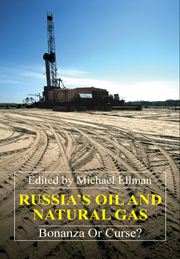9 - A Frozen Venezuela? The Resource Curse and Russian Politics
from D - Political Issues
Published online by Cambridge University Press: 05 March 2012
Summary
Introduction
A growing body of empirical research suggests that countries endowed with great natural resource wealth tend to lag behind comparable countries in terms of long-run real GDP growth, a finding that has given rise to widespread debate about a so-called ‘resource curse’ or a ‘paradox of plenty’. Explanations of the resource curse focus on a wide range of economic and political factors. The most prominent lines of argument emphasize the impact of resource wealth on the competitiveness of other tradables (‘Dutch disease’); the impact of commodityprice volatility, particularly on fiscal revenues; the interaction of commodity-price volatility with financial market imperfections, which can lead to inefficient specialization; and the impact of resource wealth on the quality of institutions, political processes and governance. Significantly, the major economic explanations of resource-exporters' poor growth performance are all, at least in principle, treatable: governments have at their disposal policy tools to mitigate, if not eliminate, such economic hardships as ‘Dutch disease’. The fact that they so often fail to do so suggests that consistent policy failure lies at the root of the problem.
If this is indeed the case, then the most promising approaches to the resource curse are likely to be those relying on political economy explanations, for the key must lie in understanding why resource-based economies are more likely than others to suffer from bad policies. The answer must be that resource wealth somehow distorts their politics in such a way as to produce institutional and policy failures.
- Type
- Chapter
- Information
- Russia's Oil and Natural GasBonanza or Curse?, pp. 189 - 212Publisher: Anthem PressPrint publication year: 2006
- 4
- Cited by

